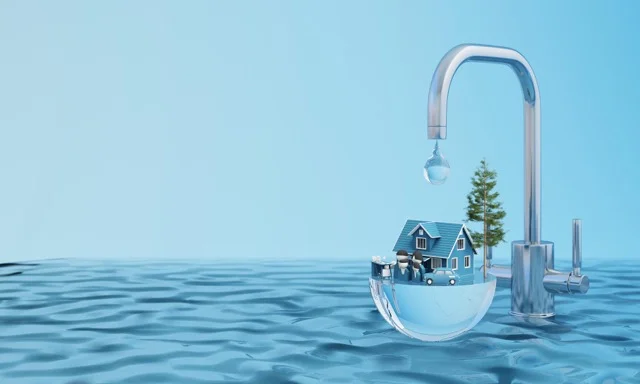4 Simple Techniques For Reclaim Waste
4 Simple Techniques For Reclaim Waste
Blog Article
The Buzz on Reclaim Waste
Table of ContentsThe Greatest Guide To Reclaim WasteSome Ideas on Reclaim Waste You Should KnowReclaim Waste - QuestionsThe 3-Minute Rule for Reclaim WasteThings about Reclaim Waste
Discover the types, events, and types of liquid waste. Residential sewage waste describes the waste and products from a household septic system. This type of waste is developed by people in houses, colleges, and other structures. This only includes septic systems that have a drain area. The proper management and disposal of domestic sewer waste require fluid waste to be moved to a sewage therapy plant where the proper approaches and equipment are put on purify and take care of waste.
Business waste typically consists of possible hazards, such as flammable products or a mixture of liquid and solid waste products, and needs an advanced and in-depth disposal procedure. The disposal of commercial waste usually entails the purification of waste before transportation to make sure secure and proper disposal. Industrial waste is created from byproducts and overflow of commercial procedures and production.
This sort of waste can not make use of the very same sewer management transportation or processes as septic or commercial liquids. The hazardous waste management process requires the assessment and testing of liquid waste before it goes through the disposal process (liquid waste disposal). Drainage waste is the fluid waste that originates from overflow and excess stormwater in extremely populated areas or cities
Overflow waste can trigger contamination and flooding if not taken care of correctly. Find out more concerning drain cleaning and waste monitoring. Guaranteeing proper waste management can prevent calamities and lower ecological harm. Both individuals in residential settings and specialists in industrial or production markets can gain from recognizing the procedures and guidelines of liquid waste administration.
Not known Factual Statements About Reclaim Waste
Get in touch with PROS Solutions today to discover concerning our waste administration and disposal solutions and the proper methods to look after the liquid waste you create.
(https://ameblo.jp/reclaimwaste1/entry-12874802223.html)Do you recognize what occurs to your water when you end, purge the toilet or drain pipes the cleaning maker? No? Well, it's worth knowing. This supposed 'wastewater' is not only a vital source yet, after treatment, will certainly be released to our land, waterways or the ocean. Made use of water from bathrooms, showers, bathrooms, kitchen area sinks, laundries and industrial procedures is called wastewater.

water used to cool down machinery or clean plant and tools). Stormwater, a type of wastewater, is drainage that flows from farming and city areas such as roofs, parks, yards, roads, paths and seamless gutters into stormwater drains, after rainfall. Stormwater streams neglected that site directly to neighborhood creeks or rivers, at some point getting to the sea.
10 Easy Facts About Reclaim Waste Shown
In Queensland, a lot of wastewater is dealt with at sewer therapy plants. Wastewater is transferred from domestic or industrial sites through a system of sewers and pump stations, called sewerage reticulation, to a sewage treatment plant. Local governments build, preserve and operate most sewer therapy plants. Operators are accredited under the Environmental Management Act 1994 to release cured wastewater at an appropriate ecological requirement into waterways.
The Division of Natural Resources suggests neighborhood federal governments regarding managing, operating and maintaining sewage systems and therapy plants. In unsewered areas, city governments may need homeowners to install individual or household sewer therapy systems to treat residential wastewater from bathrooms, kitchen areas, restrooms and laundries. The Division of Natural Resources authorises using house systems when they are verified to be effective.
In some new communities, treatment of some stormwater to remove trash, sand and gravel has started using gross toxin traps. Wastewater therapy takes place in four stages: Removes strong issue.
Wastewater after that flows into huge tanks where solids settle and are removed as sludge. Grease and scum are skimmed from the surface. Uses little living microorganisms understands as micro-organisms to damage down and get rid of staying liquified wastes and great particles. Micro-organisms and wastes are integrated in the sludge. Eliminates nitrogen and phosphorus nutrients that could trigger algal blooms in our rivers and threaten water life.
Little Known Questions About Reclaim Waste.
Nutrient removal is not available at all sewer therapy plants because it calls for pricey specialized tools. Clear fluid effluent generated after treatment may still have disease-causing micro-organisms - industrial wastewater treatment.

The majority of wastewater moves into the sewerage system. Under the Act, regional governments carry out authorizations and permits for eco relevant tasks (ERAs) involving wastewater releases that might have a neighborhood impact.
The Best Guide To Reclaim Waste
Otherwise, samples are considered laboratory evaluation. Often several tests are required to establish the levels of each of the different toxins such as oils, heavy steels and pesticides in water. Monitoring supplies accurate details concerning water quality and can verify that permit conditions are being fulfilled. The information acquired with tracking offers the basis for making water high quality choices.
Report this page